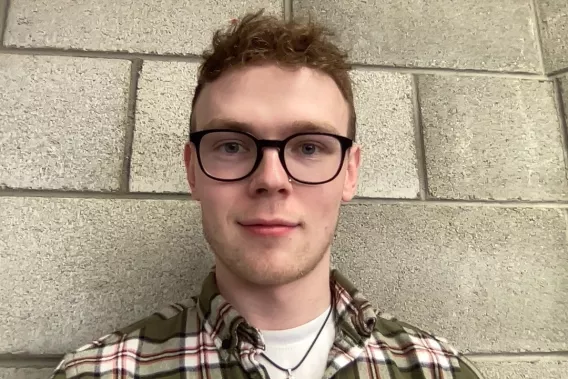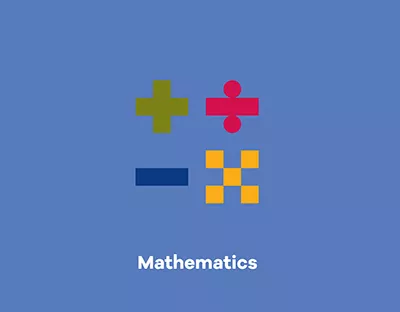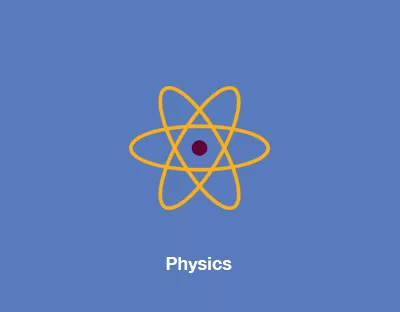Key Info
Bachelor of Science in Mathematics and Physics
Entry route(s):
Have you ever wondered
- Why is the weather so difficult to predict?
- What do stock markets and earthquakes have in common?
- How can matter be a wave on atomic scales?
- How can wave mechanics produce the next generation of computers?
- How do you model the Universe in a computer?
- How does the spreading of a disease explain star formation?
All of these questions share something in common; they can be answered at the interface of mathematics and physics. Understanding both subjects equally allows a unique view of the world that lets you capture and analyse its true complexity in an elegant way; it allows you to explain it, see effects not yet detected nor realized, and even predict how it will behave. You will need to be comfortable with mathematics, and have an innate curiosity as to how the world works. You should also be interested in applying your skills in mathematics and physics to understanding and solving real world problems.
Entry route to Mathematics and Physics at UL is via:
LM124 Mathematics Common Entry
or
Why Study Mathematics and Physics at UL?
Traditional mathematical physics degrees in Ireland have been narrow in their scope. This course seeks to provide a genuine mixture of the two subjects. In addition to developing core and advanced mathematical skills, training will be provided in fundamental physics spanning mechanics to quantum mechanics, and in state-of-the-art applications of physics such as nanotechnology.
The analytical training and broad physical understanding of challenges likely to be encountered in an industrial setting will prove to be a valuable asset for prospective employers. The applied aspects in particular will ensure that, on graduation, you will be at an advantage in comparison to more traditional Maths Physics graduates, when seeking employment in the smart economy. In such an economy envisaged by the Government, academic and industrial research will be closely coupled.
Learn more about our courses and upcoming events
What you will study
This full time programme is of four years duration. The first two years are a combination of the main modules taken in both the mathematical sciences degree and the applied physics degree at UL.
In these first two years the fundamental aspects of physics and mathematics are established. Physical subjects will include such topics as Mechanics, Waves, Light, Thermal Physics, Electromagnetism, and Modern Physics, which spans the scope of current basic understanding in physics. In addition, more applied topics are Optics and Semiconductors which are essential to modern technology.
Mathematical subjects include Calculus, Algebra, Vector Analysis, Ordinary and Partial Differential Equations, Numerical Analysis, Fourier Analysis and Computer Software.
During the spring semester of the third year, a period of cooperative education (placement in industry) provides you with practical experience in a relevant work environment. This is organised by the University’s Cooperative Education Department in collaboration with representatives from various industries, both in Ireland and abroad. Students are interviewed by company representatives. On selection, they are offered full-time employment during the Cooperative Education period and are paid at a competitive rate.
The remainder of the modules taken during third and fourth year offer a more in-depth view of both mathematics and physics. The offered modules include: Quantum Mechanics, Solid State Physics, Atomic, Molecular and Laser Physics, Nano-technology, Numerical Solution of Partial Differential Equations and Mathematics of Natural Phenomena. These more advanced subjects will prepare you for both an industrial career and also for a career in research and development.
During the final year, a project is undertaken that allows you to analyse a particular problem in depth. This also gives students interested in postgraduate research an opportunity to carry out an exploratory investigation of a potential research topic.
| Semester 1 | Semester 2 | |
| Common Entry (LM124 or LM125) | PH4102 | Waves/Light/Modern Physics |
| PH4092 | Semiconductor Devices | |
| MS4022 | Calculus 2 | |
| MS4122 | Further Linear Algebra | |
| MS4222 | Introduction to Probability and Statistics |
| Semester 3 | Semester 4 | ||
| PH4041 | Optics | PH4072 | Electromagnetism |
| PH4171 | Mechanics | PH4132 | Modern Physics |
| MS4043 | Methods of Linear Analysis | PH4042 | Thermal Physics |
| MS4613 | Vector Analysis | MS4014 | Intro to Numerical Analysis |
| MS4403 | Ordinary Differential Equations | MS4404 | Partial Differential Equations |
| Semester 5 | Semester 6 | Summer | |
| PH4061 | Quantum Mechanics | Cooperative Education | Cooperative Education 2 |
| PH4021 | Physics of Solids | ||
| MA4617 | Introduction to Fluid Mechanics | ||
| MS4045 | Complex Analysis | ||
| Elective (choose 1) | |||
| PH4161 | Atomic/Molecular/Laser Physics | ||
| MS4105 | Linear Algebra 2 | ||
| MS4035 | Probability Models | ||
| MB4017 | Geometry |
| Semester 7 | Semester 8 | ||
| PH4607 | Solid State Physics 1 | PH4608 | Solid State Physics 2 |
| MS4407 | Perturbation Tech. and Asymptotics | MS4018 | Dynamical Systems |
| PH4097 | Maths and Physics Project 1 | MS4408 | Mathematical Modelling |
| MS4098 | Maths & Physics Project 2 | ||
| Elective (Select 1xMS + 1xPH) | Elective (Select 1) | ||
| PH4081 | Nanotechnology 1 | PH4062 | Nanotechnology 2 |
| PH4091 | Physics of Modern Measurement | PH4018 | Medical Instrumentation |
| MS4008 | Numerical Methods for PDEs | ||
| MS4627 | Maths of Natural Phenomena |
Entry requirements
| Additional considerations |
Entry Requirements are dependent on the entry routes to this course. For the exact entry requirements please visit: LM124 Mathematics (Common Entry) or We welcome applications from mature students. Mature applicants must apply through the Central Applications Office (CAO) by 1 February. |
|---|---|
| Non-EU Entry Requirements |
|
How to apply
| Where are you applying from? | How to Apply |
|---|---|
| Ireland | Irish students must apply to UL via the CAO. More information can be found here. |
| The UK | Students who have completed their A-Levels can apply to UL via the CAO. More information can be found on the Academic Registry website. |
| The EU | EU Students can apply to UL via the CAO. More information can be found on the Academic Registry website. |
| Non-EU country | If you are outside of the EU, you can apply via the link in your desired Entry Route [Mathematics (Common Entry) or Physics (Common Entry)] |
Fees and funding
Student course fees are broken into three components - Student contribution, Student Levy and Tuition Fees.
A number of illustrative examples of fees for this course based on the current fee levels have been set out in the tables below.
An explanation of the components, how to determine status and the criteria involved is provided below the examples as is a list of possible scholarships and funding available.
EU Students with Free fees status in receipt of a SUSI grant
| HEA pays | Tuition Fees | €4,262 |
| SUSI pays | Student contribution | €3,000 |
| Student pays | Student Levy | €102 |
| Total | €7,364 |
EU Students with Free fees status not in receipt of a grant
| HEA pays | Tuition Fees | €4,262 |
| Student pays | Student contribution | €3,000 |
| Student pays | Student Levy | €102 |
| Total | €7,364 |
Students with EU fee status not in receipt of a grant
| Student pays | Tuition Fees | €4,262 |
| Student pays | Student contribution | €3,000 |
| Student pays | Student Levy | €102 |
| Total | €7,364 |
Non-EU Students
| Student pays | Tuition Fees | €21,798 |
| Student pays | Student Levy | €102 |
| Total | €21,900 |
Student course fees are comprised of the following components:
Student Contribution
Annual charge set by the government for all full-time third level students. All students are liable unless they have been approved for a grant by Student Universal Support Ireland (SUSI). Please refer to https://www.studentfinance.ie to determine your eligibility for a grant and for instructions on how to apply. The current student contribution is set at €3000.
Student Levy
All students are liable to pay the Student Levy of €102. Please note the Student Levy is not covered by the SUSI Grant.
Tuition Fees
These are based on Residency, Citizenship, Course requirements.
Review the three groups of criteria to determine your fee status as follows
-
Residency
- You must have been living in an EU/EEA member state or Switzerland for at least 3 of the 5 years before starting your course
-
Citizenship
- You must be a citizen of an EU/EEA member state or Switzerland or have official refugee status
-
Course Requirements
(all must be met)
- You must be a first time full-time undergraduate (Exceptions are provided for students who hold a Level 6 or Level 7 qualification and are progressing to a Level 8 course in the same general area of study).
- You must be undertaking a full-time undergraduate course of at least 2 years' duration
- You cannot be undertaking a repeat year of study at the same level unless evidence of exceptional circumstances eg serious illness is provided (in which case this condition may be waived)
Depending on how you meet these criteria your status will be one of the following -
- Free Fee Status: You satisfy all three categories (1, 2 and 3) and therefore are eligible for the Higher Education Authority’s Free Fees scheme.
- EU Fee Status: You satisfy both the citizenship and residency criteria but fail to satisfy the course requirements and are liable to EU fees.
- Non EU Fee Status: You do not meet either the citizenship or residency criteria and are therefore liable to Non EU fees.
More information about fees can be found on the Finance website
These scholarships are available for this course
| Title | Award | Scholarships Available |
|---|---|---|
| BD Science and Engineering Undergraduate Scholarship | €2,000 for one year | 6 |
| Johnson and Johnson WiSTEM2D Programme | ||
| Royal Irish Academy Hamilton Awards – Mathematics | €250 | 1 |
| The Critchley Prize | 1 | |
| The George Gooberman Memorial Prize for Excellence in Physics | 1 |
These scholarships are available for all courses
| Title | Award | Scholarships Available |
|---|---|---|
| All Ireland Scholarships - sponsored by J.P. McManus | €6,750 | 125 |
| Brad Duffy Access Scholarship | €5,000 for one year | 1 |
| Bursary for my Future Scholarship | €2,750 one off payment | 4 |
| Civic Engagement Scholarship | €1500 | 1 |
| Cooperative Education Award | 1 medal per faculty | |
| Elaine Fagan Scholarship | €1,500 | |
| Financial Aid Fund | ||
| Hegarty Family Access Scholarships | €5,000 for one year | 2 |
| Higher Education Grants & VEC Grants | ||
| Irish American Partnership Access Scholarships | €5,000 | 2 |
| Paddy Dooley Rowing Scholarship | €2,500 | |
| Plassey Campus Centre Scholarship Programme | ||
| Provincial GAA Bursaries Scheme | €750 | |
| Stuart Mangan Scholarship | ||
| The Michael Hillery and Jacinta O’Brien Athletics Scholarship | Various benefits equating to over €7,000 in value | |
| UL Sports Scholarships | Varies depending on level of Scholarship | Multiple |
Your future career
Employability skills from this degree
- Designing and conducting observational and experimental studies
- Analysing and interpreting data, finding patterns and drawing conclusions
- Dealing with abstract concepts
- Presenting mathematical arguments and conclusions with accuracy and clarity
- Advanced numeracy and analysing large quantities of data
- Logical thinking
- Numeracy—mathematical modelling, interpreting and presenting information graphically, and using mathematics to find solutions to scientific problems
- IT skills, including specialist software packages and some programming
- Attention to detail
- Communication— conveying complex ideas and using technical language correctly
Further Study Options
- PhD in a relevant research field
- GradDip in Chemical Engineering
- Bachelor of Medicine, Bachelor of Surgery (Graduate Entry)
- MA in Business Management
Job titles for graduates with this degree
Graduates progressing directly into employment take up a wide variety of roles. The following provides a sample of initial roles listed on the Graduate Outcomes Survey by graduates approximately one year after graduation:
- Data Analyst
- Financial Analyst
Student Profiles

Michael Keyes
For me, the choice to study Maths and Physics at UL was easy to make. I had always wanted to go to UL, and Maths and Physics had been my favourite subjects in school. The course seemed like a natural fit to my desire to learn about how the universe works, while employing rigorous analytical and numerical techniques.
I am involved in the design and testing of high-performance, low-noise single-photon-detecting sensors. The activities that this entails vary from day to day. I spend some days solving equations and running simulations to predict device performance or explain phenomena. Other days are spent on the implementation of these findings, by defining process conditions and ordering wafers from the foundry. Some weeks later, I analyse wafer-level test results and define packaging plans for the different devices on the wafers. Finally, some days, when we actually receive the resulting devices, I go into the lab and test them. Of course I don’t do it all on my own – there’s a lot of chatting and discussion involved to make sure we all agree on the best course of action!
I feel that my course prepared me very well for my career. Studying subjects like Optics, Thermodynamics and Solid State Physics has given me an understanding of the various physical phenomena at play in my models. My Maths subjects have likewise given me a good understanding of the equations and numerical techniques used in my simulations. Sometimes I apply my knowledge of Maths to develop ad hoc algorithms to help me.
My only advice to school leavers is to pick a course that you really think will suit you, rather than what people around you might think you “should” be doing.
For me, the choice to study Maths and Physics at UL was an easy one. I loved studying Maths and Physics in secondary school and wanted to continue studying both in university, and the University of Limerick provided a balanced mixture of both. The development of core and advanced mathematical skills complements the array of physics modules I studies, spanning from optics to quantum mechanics, as well as the cutting-edge developments in nanotechnology and laser physics, which is indispensable in industry.
During the final year, I had the opportunity to undertake a project that allowed me to analyse a particular problem in fields of maths or physics in-depth. I studies a field of maths called inverse problems, which I continue to do now as a PhD researcher. This project provided me with both an opportunity to carry out an exploratory investigation and a means to begin a career as a postgraduate researcher. In this role, I study maths underlying the techniques of medical imaging and look to enhance current modalities. To do this, I employ various formula and theorems that I have studies throughout my course. This allows us to create better algorithms to improve the quality of the images of the interior of a body, so that we can detect anomalies in the body.
Studying here at UL has helped me develop the skills necessary for a wide variety of jobs in industry and academic research; skills I still use today. Studying subjects like electromagnetism, modern physics and solid state physics has given me an understanding of the various physical phenomena at play in my research, while the mathematic modules I have studies, such as partial differential equations and calculus, have given me a good understanding of the equations and numerical techniques used throughout my work.
My advice to all applicants is to choose a course that you will enjoy. It'll lead to a far more successful and fulfilling career than choosing a course that is 'supposed' to lead to a good job.



